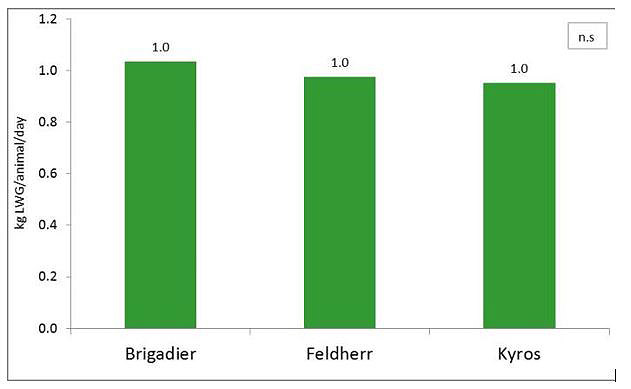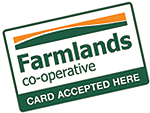 |
|
|
|
Issue 80 / Spring / November 2016
Hi [firstname]
 Welcome to the November 2016 SeedData newsletter and what a month it has been.
Welcome to the November 2016 SeedData newsletter and what a month it has been.
Like all New Zealand's farmers, our thoughts go out to the farmers that have been affected by the severe earthquake early on Monday morning.
I note that this earthquake has now been upgraded to a 7.8. Coming from Christchurch, I fully understand the meaning of that.
It's great to see how quickly support is flowing through and since the earthquake. Federated Farmers have been fielding plenty of offers of help.
Should you wish to be a part of this, please use the following contact details:
- Please phone 0800 FARMING (0800 327 646) if you offer any assistance, or you can contact Federated Farmers adverse events spokesperson Katie Milne on 027 424 4546.
In this month's newsletter, we look at some of the latest research results on grazing fodder beet with beef cattle.
We talk about Viscount, a new tetraploid from NZ Agriseeds and last, but not least, I look at one of my favourite products - Goliath Rape.
Please browse these topics below:

Grazing Fodder beet with beef cattle - trial results.
Fodder beet is now commonly grazed by beef cattle.
Several opinions and theories have been offered about which cultivars are best for this, with some suggesting that certain cultivars are better because they are more palatable, softer, have more water, are higher out of the ground, have more protein, or have greener leaf content.
This trial was designed to compare the performance of beef animals on different types of fodder beet in the same conditions, at the same time, and with the same type of animal.
The trial method
- On a farm at Winchmore, Mid-Canterbury, an area of land that was recently divided into three paddocks was chosen to establish the crops in October 2015.
- Three cultivars of beet were planted in each paddock, a medium dry matter fodder beet (cv. Kyros), and low dry matter fodder beet (cv. Feldherr), and a low dry matter mangel (cv. Brigadier).
Each crop received identical management inputs. They established well and grew to typical yields (mean of 20.3 tonne DM/ha).
- In May 2016, an even line of cattle of the same sex and breed were selected from a large line and randomly split into three mobs of 50 animals.
Once transitioned (14 days) onto fodder beet, they were weighed fresh off the crop for their starting weights (20 May).
- The animals were all managed in the same way, aiming to maximise intake of fodder beet and cattle had access to straw at two kilograms per animal per day.
The cattle were weighed again on 27 July, fresh off crop (photo below shows cattle coming from the Kyros treatment).
The trial results
- The cattle had an average daily weight gain of 1kg per animal (Fig. 1), gaining 68 kilograms over 68 days.
- There were no differences between the three types of beet.
- Crop utilisation was very high on each crop, with not enough residue left to be measured.
Figure 1. Mean daily liveweight gain.

|
Conclusion
- Growth rate of cattle and crop utilisation was not affected by the type of fodder beet grazed.
- The sole determinant of relative profitability of fodder beet cultivars is therefore their yield potential.
- Cultivars with higher yield will generate more profit.
Specialty Seeds would like to thanks DLF Seeds for conducting this trial and publishing the trial results.
Should you have any questions please feel free to contact us.
Website Link: View the Specialty Seeds Fodder beet website page
Contact Link: Contact Specialty Seeds if you have any other questions.
Back to top
 Viscount - New tetraploid perennial ryegrass looks promising
Viscount - New tetraploid perennial ryegrass looks promising
 Last month we talked about NZ Agriseeds latest diploid perennial Tyson.
Last month we talked about NZ Agriseeds latest diploid perennial Tyson.
This month we will have a look at their latest tetraploid perennial ryegrass, Viscount.
We were lucky enough to get a small amount of Viscount this season which has gone out onto farms where we can see it in action.
Viscount has been a standout tetraploid perennial ryegrass in Agriseeds plant breeding programme, with significantly more early Spring growth and better total yield than Bealey.
Add to this improved rust resistance and better summer feed quality too.
Viscount has a flowering date of +19 days (6 days earlier than Bealey). The biggest gain with Viscount is in its early Spring growth, coinciding with calving when feed is most valuable.
For dairy farmers, extra grass at this time of year has been valued at an average of $0.46 kg/DM in the DairyNZ Forage Value Index. Viscount has reduced aftermath heading and improved rust tolerance.
It is more upright for ease of harvest, allowing good clover content and boosting animal performance.
In addition to providing high quality feed, Viscount comes with NEA endophyte, similar to that in Bealey and Shogun.
This plays an important role in providing superior animal performance with a very low risk of animal health problems, such as ryegrass staggers.
For more information on Viscount please select the download links below or feel free to contact us with any questions.
Download Link: Download a Viscount ryegrass information brochure for more information.
Contact Link: Contact Specialty Seeds if you have any questions or would like to make an order.
Back to top
 One of my favourite products - Goliath Kale.
One of my favourite products - Goliath Kale.
Every once in a while, a new cultivar comes along that I think changes the game and offers our clients a significant opportunity to improve what they are currently using.
A few years ago now, PGG Wrightsons Seeds Ltd released two new rape cultivars Goliath and Titan that were in fact rape x kale cultivars.
PGG Wrightson Seed's marketing calls Goliath “The versatile all rounder”. It's a good description and one of the reasons I find it very easy to recommend to our clients.
Since their release we have sold a lot of both cultivars but Goliath has been the one I've sold the most of.
I like to sell Goliath because of the way it performs for my clients and with rape planting season just around the corner I thought I'd put the benefits of Goliath in front of you again.
Goliath is a high yielding, multi-graze giant rape with a potential yield of 10,500 kg DM/ha, which can be grazed starting between 90 to 110 days after planting.
Goliath provides excellent Summer/ Autumn/ early Winter feed with excellent utilisation.
Goliath is suitable and safe for all stock types and is normally sown at 4kgs per hectare, when sown alone or 1-2 kgs per hectare, when mixed with short term ryegrasses (e.g. Devour or Kano).
Another stand out for Goliath is its aphid tolerance which is a very important trait for a rape to have.
Goliath is available in Gaucho, Superstrike or Ultrastrike seed treatments and we currently have good stocks of it in store.
For more information on Goliath please follow the links below, or please contact us.
Download Link: Download the Goliath Rape information sheet
Website Link: View the Specialty Seeds Brassica website page more information
Contact Link: Contact Specialty Seeds if you have any other questions.
Back to top


As always, we hope this issue has been of some value to you. If you have a comment on this newsletter or anything on our website, please give us a call on our Freephone: 0800 727 8873, send us an email at: mail@specseed.co.nz.
Kind Regards

Stephen Finch & David Percival
Specialty Seeds - New Zealand
|
|
|
|
 |
|
|

|
If you are having trouble viewing this email, .
If you would like to be removed from this newsletter please click here to
|
